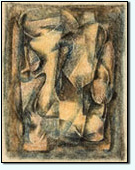Publications
Reminiscences > Ary and the English Language
When Ary came to this country as a boy of 16 he had to go to work at once and work meant morning, afternoon and evening, so there was no time for formal learning of the new language. It all had to be picked up through his business or social contacts (the latter mostly immigrants like himself). Soon of course there were newspapers to read and eventually books. Because he had very little interest in trivia or small talk, he never mastered many of our "everyday" expressions. However, when it came to more profound subjects dealing with philosophy, history and above all art, he was truly eloquent. And he wasted no words and no irrelevant or superficial thoughts; he got right down to the core of things, to the basic truth. Many a time at the 8th Street Club in New York, where avant-garde painters, composers and poets met in the early 50s, Ary would get up to speak after an evening of involved and pretentious argument. At the first few words there would sometimes be laughter, for Ary's accent was a queer one and his intensity so evident. But after a moment or two there would be silence, and close attention to his every word. And when he was through the discussion was through, for he had brushed aside all the irrelevancies and had gotten down to basic values, and there was no refuting what he had to say.
“He really didn't construct sentences —he painted them like brush strokes and once the brush stroke of his idea was made, he was on to other ideas without bothering to fill in the words that would complete the sentence.”
One thing that made it difficult to follow Ary's conversation was that he rarely finished a sentence. He really didn't construct sentences —he painted them like brush strokes and once the brush stroke of his idea was made, he was on to other ideas without bothering to fill in the words that would complete the sentence. Yet when I pinned him down to expressing his views on art or narrating some special story, he could speak beautifully. The quotations that have been used in the booklet gotten out by the Foundation are either from his words quoted from catalogues or books in which he was represented, or from comments he dictated to me, and they are reproduced faithfully, not edited by me. The same is true of the chapters of his life, which he dictated to me.
In our later years we used to read aloud a great deal, mostly because Ary didn't want to strain his eyes and I happen to enjoy reading aloud. But when it came to poetry, I bowed out in favor of Ary, for he read it with much more effectiveness, and in fact, he understood it much better. It fitted in with his brush stroke way of speaking, and it dealt with the essence, the core of things, and he intuitively sensed it and understood it. In the late 40s when we started reading T.S. Eliot and his generation, and I was at a loss as to meaning, Ary would tell me not to try to understand, just to get the impact. "Impact" was one of his favorite words; others come to mind —crystallization; mysticism; orientate; articulate; texture; juicy (speaking of color or painting quality). And of course "inner reality."
Just a few weeks before Ary's death, when he was in a weakened and only half-aware condition, I read to him one afternoon some of the poems of the young contemporary Russian poet, Voznensky; he listened avidly, and with tears in his eyes said again and again, "Oh, it's beautiful, it's beautiful."
When Ary was really in form, he had great powers of communication. Fortunately he and I had almost uninhibited communication, and we would never tired of talking together. Somehow there was always something fresh, something new, even after our many years of living together. It seemed that 24 hours a day were never enough to explore all the thoughts and feelings of one another. Of course there was another world — Ary's dream world, his world of creativity — into which I could not enter, but I had the great joy of seeing the results of his dreams. And I had constant assurance, by look and by words, of Ary's great love for me.
Ary spoke French, German, Russian, Spanish, Yiddish and some Hebrew. His French was especially fluent, and in all these tongues, as in English, Ary's vocabulary and ease of expression were immeasurably better when he dealt with more serious abstract matters. Once at an outdoor cafe in Vence, on the Riviera, a French professor at the next table mistook Ary for a Frenchman, and after a lengthy conversation on aesthetic and philosophic subjects, asked him at what university he was teaching. But then the professor's friends at his table began to question Ary about business, politics, sports in the United States, and as Ary tried to answer the professor said, "Ah, now I see that you are not as at home in the French language as I had thought."
Copyright © 2002-2007 The Stillman-Lack Foundation.
All text and images on this site may not be published, broadcast, or distributed in any form without the prior written permission of The Stillman-Lack Foundation.


